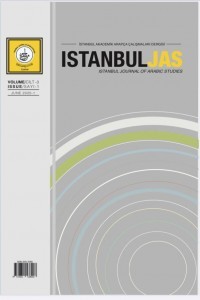من غرناطة إلى إسطنبول: دراسة في رحلة بيت بني داود البلوي
غرناطة, إسطنبول, الهجرة الأندلسية, بيوتات العلم, بنو داود البلوي
From Granada to Istanbul: A Study in the Trip of Banu Daoud al-Balawi
Granada, Istanbul, Andalusian families, banu-Daoud family,
___
- ابن خلدون عبد الرحمن، المقدمة، تح: عبد السلام الشدادي ، خزانة ابن خلدون بيت العلوم والفنون والآداب، د- ت
- De Epalza .M, « les ottomans et l’insertion au Maghreb des andalous expulses d’Espagne au XVII e Sc », Revue d'Histoire Maghrébine, N° 31-32 ,Tunis 1983 .
- عامر قبج ، " السياسة اصليبية البابوية – الأسبانية تجاه الأندلس بعد سقوط القسطنطنية "، مجلة جامعة النجاح للأبحاث ، المجلد 30(1) ، سنة 2016.
- محمد عبده حتاملة، التتصير القسري لمسلمي الأندلس في عهد الملكين الكاثوليكيين(1474-1516)، ط1، الجامعة الاردنية ، عمان 1980.
- محمد عبد الله (عنان): "موقف القسطنطينية وباقي العالم الإسلامي من سقوط الأندلس وأواخر مسلميها وأمام الغزو الأوروبي للعالم الإسلامي"، مجلة الأصالة، العدد 27 دار البعث- الجزائر، (سبتمبر، أكتوبر) 1976.
- Albert MAS, Les Turcs dans la littérature espagnole du Siècle d'Or, Paris, Centre de recherches hispaniques, 1967.
- L. Cardaillac, «Le Turc, suprême espoir des Morisques » in Actes du Premier Congrès d'histoire et de la Civilisation du Maghreb, Tunis, 1979, vol. II.
- علي منتصر الكتاني ، انبعاث الاسلام في الأتدلس، دار الكتب العلمية ، ط1، بيروت 2005 .
- محمد يحيى المضواحي ، الأندلسيون عقب سقوط غرناطة مأساة شعب لأكثر من مائة عام(897-1017ه/1492-1609م) ، كتوبيا للنشر والتوزيع، القاهرة2017.
- المقري ، نفح الطيب من غصن الأندلس الرطيب وذكر وزيرها لسان الدين بن الخطيب، تح :إحسان عباس، دار صادر بيروت ، 1968.
- عادل سعيد البشتاوي، الأندلسيون المواركة (دراسة في تاريخ الأندلسيين بعد سقوط غرناطة)، القاهرة، مطابع أنترناشيونال برس، 1403هـ/1983م، دط .
- عبد الجليل التميمي، الولايات العربية ومصادر وثائقها في العهد العثماني، ج:1، د د ن، تونس، د ط، 1984م.
- Henri Lapeyre, géographie de l’Espagne morisque, S.E.V.P.E.N,Paris , 1959.
- Prescott William Hickling, The reign of Ferdinand and Isabella(1479-1516), A.L.Burt.Publisher,New york.
- M.De Epalza, « Références au Maghreb dans les derniers documents de Charles Quint(1554-1558) » , in Revue d'Histoire Maghrébine, 1980, N°20 , Tunis 1980 .
- A. Temimi, «Le Gouvernement ottoman face au problème morisque», in Revue d'histoire Maghrébine, Tunis,1981, N° 23-24.
- ليلى الصباغ، "ثورة مسلمي غرناطة عام (976هـ أواخر عام 1568م) والدولة العثمانية"، مجلة الأصالة، مطبعة البعث، الجزائر، العدد 27، (سبتمبر، أكتوبر 1975م).
- إبراهيم القادري بوتشيش، مباحث في التاريخ الاجتماعي للمغرب والأندلس خلال عصر المرابطين، دار الطليعة للطباعة والنش، 1998.
- ابن الخطيب لسان الدين ، الإحاطة في أخبار غرناطة ، تح: عبد الله عنان، ط2،مكتبة الخانجي ،القاهرة1973 .
- المنتوري، فهرسة، تح: محمد بنشريفة، ط1، مركز الدراسات والأبحاث وإحياء التراث ،الرباط2011 .
- محمد عبد الوهاب خلاف، قرطبية الإسلامية في القرن11م، ط1، الدار التونسية للنشر،تونس 1984.
- ابن الخطيب، الإحاطة في أخبار غرناطة-ما لم ينشرمنها- ، تح: عبد السلام شقور،كلية الآداب، تطوان 1988 .
- ابن الزيات التادلي، التشوف إلى رجال التصوف وأخبار أبي العباس السبتي ، تح: أحمد التوفيق، ط1، منشورات كلية الآداب والعلوم الإنسانية، الرباط 1984.
- رستم محمد زين العابدين ، بيوتات العلم والحديث في الأندلس ، ط1، دار ابن حزم ،بيروت2009 .
- السمعاني ، الأنساب ، تحقيق: عبد الرحمن بن يحيى المعلمي اليماني ،ط2، مكتبة ابن تيمية ،القاهرة 1980.
- البلوي ، ثبت ، تحقيق عبد الله العمراني ، منشورات الجمعية المغربية للتأليف والترجمة والنشر، دار الغرب الإسلامي، بيروت 1983 .
- التمبكتي، نيل الإبتهاج بتطريز الديباج، تحقيق: علي عمر،ط1،مكتبة الثقافة الدينية ،2004.
- ابن غازي ، فهرسة ، تح: محمد الزاهي ، ط1، دار بوسلامة ، تونس ،1984.
- كحالة عمر ، معجم المؤلفين" تراجم مصنفي الكتب العربية " ، مؤسسة الرسالة، 1993 .
- حاجي خليفة ، كشف الضنون عن أسامي الكتب والفنون ، تحقيق : محمد شرف الدين يالتقايا، دار إحياء الثرات العربي، بيروت .
- السخاوي، الضوء اللامع لأهل القرن التاسع ، ط1 ، دار الجيل، بيروت1992 .
- ابن الخطيب ، معيار الاختيار في ذكر المهاعد والديار، تحقيق : محمد كمال شبانة، مكتبة الثقافة الدينية ، الاسكندرية 2002.
- Jean Luc Arnaud , Tissu urbain et histoire , le cartier de Galata à Istanbul , anatolia moderna, yeni anadolu , institut français d’ études anatoliennes .
- Ercüment Kuran, “Cezayirli Türklerin Endülüs Müslümanlarını Kuzey Afrika'ya Nakli ve Neticeleri”, Endülüs'ten İspanya'ya, Ankara, TDV, 1996.
- Qiyas SUKUROV, Endulus istidanamesi ve kemal reis’in Ispanya seferi, Istem.Yil:7.sayi:14.2009.
- المقري ، أزهار الرياض في أخبار القاضي عياض، تح: مصطفى السقا،إبراهيم الأبياري، عبد الحفيظ شلبي، مطبعة لجنة التأليف والترجمة والنشر، القاهرة 1939.
- المراكشي ، الإعلام بمن حل بمراكش وأغمات من الأعلام ، مراجعة عبد الوهاب بن منصور ، ط2 ، المطبعة الملكية ، الرباط 1993 .
- عنان محمد عبد الله ، دولة الإسلام في الأندلس ، القسم الرابع نهاية الأندلس وتاريخ العرب المتنصرين ، ط4، مكتبة الخانجي ، القاهرة 1997.
- ISSN: 2651-5385
- Yayın Aralığı: Yılda 2 Sayı
- Başlangıç: 2018
- Yayıncı: İbrahim ŞABAN
Türk – Arap İlişkileri Eski Eyaletler Yeni Komşulara Dönüşürken (1914-1923)
Yetişkin Öğrencilerin Arap Alfabesinin Öğrenimine ve Sesletimine Dair Kaygıları
الإطارُ المَرجعيُّ لِلكَفاءَةِ اللُّغويّة لحِلْفِ شَمالِ الأَطلَسِيّ - عَرضٌ وتَحليلٌ
من غرناطة إلى إسطنبول: دراسة في رحلة بيت بني داود البلوي
"WEKA التصنيف الآلي للبيانات النصية العربية باستخدام البرامج الحاسوبية "برنامج
